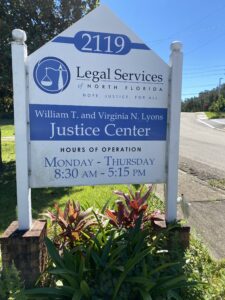
Due to COVID-19, the Centers for Disease Control and Prevention enacted a moratorium to protect tenants from being evicted due to unpaid rent. The measure was designed to prevent homelessness.
However, after months of keeping landlords from evicting tenants, the federal government eviction moratorium ended on Aug. 31.
Nathalia Cowen, a bio pre-med student at FAMU, reflected on how lifting the eviction moratorium has added pressure to pay rent.
“I was relieved to know that the eviction moratorium was put in place to help residents that needed extra time to pay rent. However, as a college student and a full-time entrepreneur, there is more pressure now than ever to make sure I can pay rent to avoid possible eviction,” Cowen said.
Mary Rose Whitehouse, an attorney at Legal Services of North Florida, said ending the eviction moratorium has affected residents and the court system.
“The eviction moratorium was overturned by the U.S. Supreme court last month. When it was in place, it kept millions of Americans from being eviction of nonpayment of rent. COVID-19 has affected the eviction rates tremendously; many folks are out of a job making it easy to fall behind on rent,” Whitehouse said.
Whitehouse encouraged Leon County residents to take legal action to avoid eviction.
“They should reach out to an attorney; most counties have their own legal aid. One thing that is important to know about evictions is that they are accelerated procedures, they are different from a divorce that could take a long time. As soon as you receive the three-day notice you should contact an attorney. And Legal Services of North Florida is here to help the community,” Whitehouse added.
In Leon County, more than 6,000 people applied for Leon Cares rental assistance for additional housing aid. However, 2,500 people are still waiting on funding.
Kimberly Ladner, director of the Kearney Center, the area’s homeless shelter, encourages people that are evicted to take measures to avoid becoming unsafe.
“Some of the people coming in are affected by the eviction moratorium. If you are evicted, my first recommendation is to seek any mediation with your landlord. You can do that on your own or seek out legal service. Second, if you are evicted, seek out any kind of assistance with a friend or family member to avoid becoming homeless and living in a situation that is unsafe,” Ladner said.
“We do have an intake and diversion team here and we do have funding to help you be diverted from homelessness, because we all know trauma causes homelessness, and homelessness causes trauma, and we want to stop that cycle,” Ladner added.
Due to COVID-19 and CDC regulations, the Kearney Center is limited to 187 people who can be sheltered.
If you need assistance for legal aid, reach out to Legal Services of North Florida at (850) 385-9007.